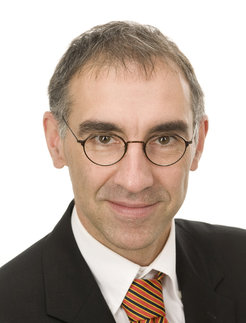Thomas Udem is awarded EPS-QEOD New Prize
The Quantum Electronics and Optics Division of the European Physical Society has elected Dr. Thomas Udem for its first ever Prize for Research in Laser Science and Applications.

The Quantum Electronics and Optics Division of the European Physical Society [EPS-QEOD] has elected Dr. Thomas Udem, scientist in the Laser Spectroscopy Division at MPQ, for its first ever Prize for Research in Laser Science and Applications. Thomas Udem receives this prize “for significant contributions to the development of optical frequency combs and their extension into the vacuum-ultra-violet region, as well as the realization of applications in astronomy, metrology and ultra-precise fast sensitive spectroscopy”. The European Physical Society, founded in 1968, represents the community of European physicists, playing an important role in their scientific and political activities.
Thomas Udem studied physics at the University of Washington in Seattle (USA) and at Justus Liebig University, Gießen (Germany) where he graduated with a diploma degree in 1993. In 1994 he started to work in Prof. Hänsch’s division on his doctoral thesis entitled “Phase-coherent optical frequency measurement on atomic hydrogen. Determination of the Rydberg constant and the 1S Lamb shift.”, which he completed in 1997. After obtaining his Habilitation at the Ludwig-Maximilians-Universität München (Germany) and a post doc at the National Institute of Standards and Technology (NIST) at Boulder (USA) he became staff scientist in the Laser Spectroscopy Division.
High precision spectroscopy of hydrogen constitutes a test of the theory of Quantum Electrodynamics (QED), which describes the interaction between light and matter. To increase the measuring accuracy to compare with very accurate theoretical predictions, Prof. Theodor W. Hänsch, Dr. Thomas Udem and Dr. Ronald Holzwarth devised the so-called frequency comb technique at the end of the nineties, which allowed optical frequencies to be directly measured. Instead of determining the wavelengths as in traditional spectrometers the frequency comb technology allows to count the very large number of oscillations per second of a laser light wave. For the development of this new measuring tool Prof. Theodor W. Hänsch, Director at MPQ and head of the Laser Spectroscopy Division, was awarded the Nobel Prize in Physics in 2005.
With this new technique the scientists have achieved unprecedented precision in hydrogen spectroscopy. Some of the new projects of Dr. Udem extend high precision spectroscopy to hydrogen-like or helium-like ions such as He+ or Li+ which should allow even more sensitive tests of Quantum Electrodynamics. To this end, his group focuses on extending the frequency combs to much shorter wavelengths by employing the process of high-order harmonic generation. Other projects aim at calibrating astronomical instruments in order to probe cosmic dynamics, e.g. to determine the proclaimed acceleration of cosmic expansion.
Dr. Udem is co-recipient of the Philip Morris Research Prize 1998. In July 2005 he was awarded the endowment prize of the “Münchener Universitätsgesellschaft”, in 2006 the Röntgen Prize from Justus Liebig University, Gießen. In 2010 he was elected as Fellow of the Optical Society of America (OSA), in 2011 as Fellow of the American Physical Society (APS). Thomas Udem will receive the 2013 Prize for Research in Laser Science and Applications at the 6th EUROPHOTON conference, which will be organised by the EPS-QEOD from 24 to 29 August 2014 in Neuchâtel, Switzerland. During the award ceremony, he will present an overview of his work. Olivia Meyer-Streng
